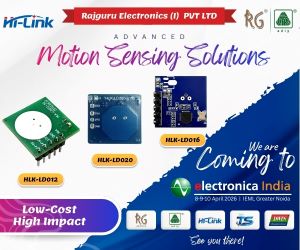The instruments we see today were either non-existent or worked very differently ten to fifteen years ago. It would not be wrong to say that the field of instrumentation is a superset of the fast-changing fields of electronics, information technology, measurement and electronic communication. Basically, it is a multi-disciplinary stream.
Instrumentation engineering is loosely defined because the required tasks are very domain-dependent. For instance, a biomedical instrumentation expert has very different concerns from a rocket instrumentation expert, though both might have some common concerns such as selection of sensors based on various parameters.
“Instrumentation has been the fundamental engine for catalysing R&D in India. Segments like communication, aerospace and defense, industrial, computers and semiconductors, education and academia, and general-purpose electronics also use instrumentation to validate their devices, designs and deployment,” informs Jyotsna Kukreti Dobriyal, HR operations, Agilent Technologies India.
“New concepts of instrument-aware systems have opened this domain even further. Engineers at any level, whether it is design, validation or software development, need proper knowledge of test methods. This domain is growing in India,” she adds.
Hemant Kamat, chief technology officer, Shalaka Technologies, too believes that instrumentation is a very important aspect of manufacturing industry. “Instrumentation is applied in R&D, process, manufacturing and quality departments of manufacturing organisations. It is also important in building management systems—a market that is growing significantly in India,” he shares.
Scope, roles and responsibilities
Unlike services vertical, instrumentation industry is not manpower-intensive. However, it requires talented individuals that have specific skills in measurement science and engineering, believes Jyotsna. “Those who are sound in fundamentals and have specific knowledge of measurement systems will find multiple career options within this industry,” she says.
With the increasing demand for electrical power and developments in audio and video communication systems and the automation industry, electrical/instrumentation engineers have become vital to the society today.
Task & responsibilities of an instrumentation engineer
– Develop concept designs and feasibility studies
– Design or update specifications and designs of electrical systems and equipment
– Design ways to generate and manage electricity
– Devise ways to control processes using automation techniques and computers
– Examine safety aspects of the planned work
– Plan manufacture or use of equipment and appliances
– Oversee testing of new systems and correction of faults
– Supervise the installation and maintenance of systems and equipment
– Design new control systems, and develop, maintain and modify existing systems
– Work collaboratively with design engineers, operation engineers, purchasers and other internal staff
– Contact clients, suppliers, contractors and relevant authorities
– Project management within cost- and time-constrained environments
– Write computer software
– Develop new business proposals
– Liaise with clients, suppliers, contractors and relevant authorities, e.g., the Nuclear Decommissioning Authority
– Understand and ensure compliance with health and safety regulations and quality standards of the country in which work is undertaken
“Industries such as textile, pharmaceutical, paper, metallurgy, automotive, marine, locomotive and aerospace also require instrumentation engineers,” says Kamat.
Instrumentation engineering comprises design and development of more efficient electrical machinery, control equipment and power systems for generation, transmission and distribution of electrical energy, and telecommunication. Instrumentation technicians perform operations like commissioning, installation, calibration, maintenance and repair of complex measurement and control systems used in a variety of process control operations. Those willing to make a career in this field should have a sound knowledge of measurement and control principles of pneumatic and electronic instruments theoretically as well as practically. Tasks and responsibilities of instrumentation engineers vary from company to company (please see the box).
Qualification required
A BE or B.Tech degree is desirable. However, a diploma course in instrumentation engineering after passing 10th standard will be sufficient for becoming a junior engineer. Even 10+2 passouts in science stream with physics, chemistry and mathematics as main subjects are hired. If research interests you, enroll in a Ph.D programme after completing your post-graduation. Besides basic sciences and regular engineering subjects, microwave communication, radar and television engineering, microelectronics, computers, and communication and control systems are taught at graduation level.
“Instrumentation engineers can be science graduates in physics, chemistry and geology, engineering diploma holders or graduates in electronics, instrumentation and electrical engineering. Mechanical and chemical engineers with exposure to electronics can also qualify for the job,” says Kamat.
Other areas where aspirants could look to develop their skills are intelligent controls, sensor network, speech processing, monitor control and digital signal processing to name a few.
Nature of the job
“There are many entry-level roles in the field of instrumentation engineering. Prominent among them are sales engineer, application engineer, service engineer and marketing engineer,” informs Jyotsna.
Jyotsna explains, “Sales engineers identify customer requirements and position the right product and solution from their portfolio to best align with the customer’s measurement needs. They also manage and grow customer base for the company. An application engineer has in-depth knowledge of measurement techniques and products, and is responsible for demonstrating and applying solutions, mostly on-site at the customer’s place. This enables sales and increases customers’ confidence in the company and its capabilities.”
“Marketing engineers execute all marketing-related initiatives to enhance sales activities. They are responsible for introduction of new products and technology in the marketplace and constantly assessing customer needs. Service engineers provide post-sales repair and calibration support to the end-users and help maintain their product uptime and precision,” she adds.
Other opportunities are in the areas of automation and control, plant maintenance, instrumentation design, sales and marketing, service engineering and R&D (DRDO, ISRO and DAE).
Job prospects (Courtesy: http://education.sulekha.com/)
– Instrumentation engineers find jobs in R&D units in both private and public sectors.
– Opportunities are available in heavy industries such as steel plants, thermal power stations, refineries, fertiliser plants and cement plants. Instrumentation engineers are also employed by defense establishments.
– Career avenues are available in management, sales and technical projects.
– Top employers for instrumentation engineers in India:
(a) Private sector: UltraTech Cement, Alchem International, A.R. Software, HCL Infosystems, TCS, Infosys, Accenture
(b) Public sector: Railway Recruitment Board, Steel Authority of India Ltd (SAIL), Bharat Heavy Electricals Ltd (BHEL), National Fertilisers Ltd (NFL), Indian Oil Corporation Ltd (IOCL)
“Instrumentation engineers may be required to travel extensively and frequently to remote areas for equipment installation or maintenance of already installed equipment,” informs Kamat. “R&D and design requires a deep insight into analogue electronics, which is a rare skill these days in fresh graduates from Indian universities,” he adds.
Skills & training
“Apart from a training in electronics (digital and analogue), instrumentation engineering aspirants should undergo training in handling, calibration and field diagnostics of instruments in various domains,” informs Kamat. Generally, this training is provided by the employers to graduate trainees.
“Instrumentation engineers need to be strong in analytical and logical skills apart from being competent in their core area of academic training,” Kamat says.
Talking about the training provided at his company, Kamat says, “Being an embedded systems service provider, my company imparts training in fundamental concepts of embedded systems, microcontrollers and digital signal processors and design of embedded systems for instrumentation. We have a comprehensive assimilation programme for experienced newly hired as well as freshers.”
Top institutions for instrumentation engineering
– Most of the IITs and NITs
– Birla Institute of Technology and Science (BITS) Pilani
– Rashtreeya Vidyalaya College of Engineering
– Vellore Institute of Technology
– PSG College of Technology
– International Institute of Information Technology Bangalore
– Netaji Subhas Institute of Technology (NSIT)
Talking about the training at Agilent, Jyotsna shares, “Post the initial company- and business-related orientation, the programme is customised to the new hired. Freshers go through a three to six months long programme where they get trained in measurement science principles, products, technology and processes by subject matter experts. In addition, they get an opportunity to shadow a senior at work for a set period of time so that they can get first-hand experience of the job.”
Pay package
Typically, the pay package depends on various parameters such as the size and origin of the company, criticality of the job profile and location. However, a fresh graduate may expect anywhere from Rs 20,000 to Rs 24,000 per month, informs Kamat.
“As with any other industry, pay packages are competitive, and in line with the candidate’s qualifications and previous experience,” shares
Jyotsna.









